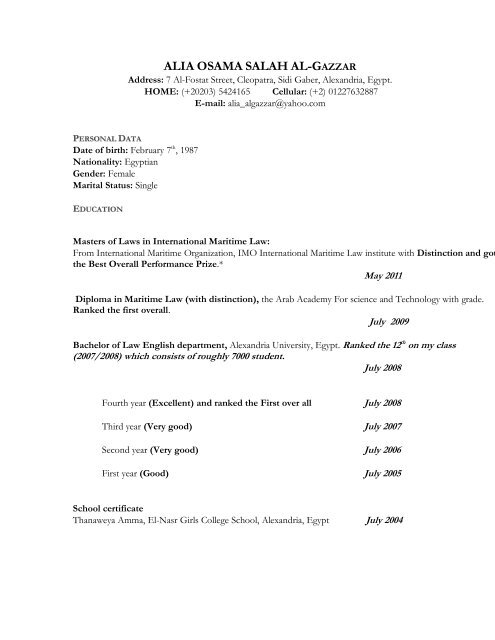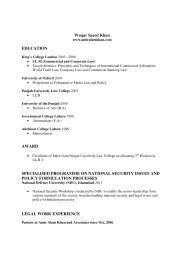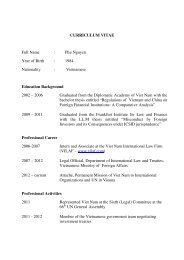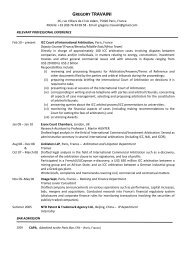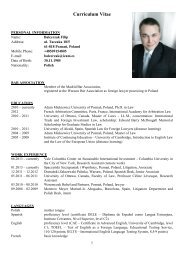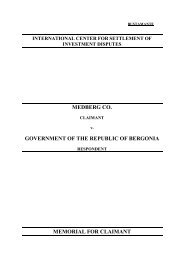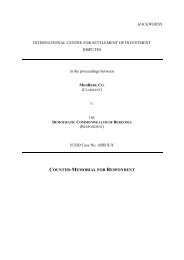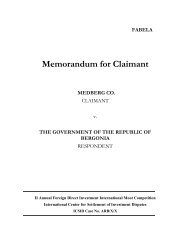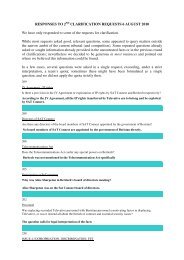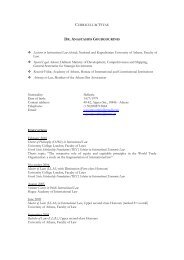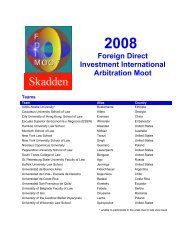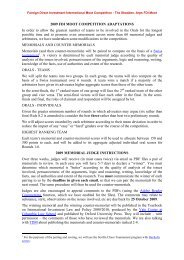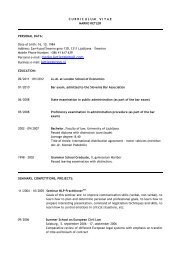ALIA OSAMA SALAH AL-GAZZAR - FDI Moot
ALIA OSAMA SALAH AL-GAZZAR - FDI Moot
ALIA OSAMA SALAH AL-GAZZAR - FDI Moot
Create successful ePaper yourself
Turn your PDF publications into a flip-book with our unique Google optimized e-Paper software.
<strong><strong>AL</strong>IA</strong> <strong>OSAMA</strong> <strong>S<strong>AL</strong>AH</strong> <strong>AL</strong>-<strong>GAZZAR</strong>Address: 7 Al-Fostat Street, Cleopatra, Sidi Gaber, Alexandria, Egypt.HOME: (+20203) 5424165 Cellular: (+2) 01227632887E-mail: alia_algazzar@yahoo.comPERSON<strong>AL</strong> DATADate of birth: February 7 th , 1987Nationality: EgyptianGender: FemaleMarital Status: SingleEDUCATIONMasters of Laws in International Maritime Law:From International Maritime Organization, IMO International Maritime Law institute with Distinction and gotthe Best Overall Performance Prize.*May 2011Diploma in Maritime Law (with distinction), the Arab Academy For science and Technology with grade.Ranked the first overall.July 2009Bachelor of Law English department, Alexandria University, Egypt. Ranked the 12 th on my class(2007/2008) which consists of roughly 7000 student.July 2008Fourth year (Excellent) and ranked the First over all July 2008Third year (Very good) July 2007Second year (Very good) July 2006First year (Good) July 2005School certificateThanaweya Amma, El-Nasr Girls College School, Alexandria, Egypt July 2004
PROFESSION<strong>AL</strong> EXPERIENCE & ACTIVITIESMember of the Swiss Arbitration Association.12 April 2012Attended the ICC YAF YAAP conference on Young Approaches to Arbitration.31 March 2012Attended the <strong>Moot</strong> Alumni Association Young Generations in Arbitration Vienna IX Workshop30 March 2012Coach of the Egyptian Team leader and member in the Nineteenth Annual Willem C. VisInternational Commercial Arbitration <strong>Moot</strong>, ViennaMarch-April 2012Arbitrator in the 2nd Annual Willem C. Vis Middle East International CommercialArbitration Pre-<strong>Moot</strong>, Muscat, OmanFebruary 29 – March 1, 2012Revised the legal accuracy of an Article on the United Arab of Emirates Ship Mortgage Lawpublished in the Shipping and Transport Lawyer International magazine.February 2012Participated as the Egyptian Team leader and member in the 11 th Annual Canadian RegionalPre-moot, Video Conferencing28 January 2012Secretary General of the Arab Society for Commercial and Maritime Law (ASCML)November 2011Associate member of the Chartered Institute of Arbitrators (ACIArb) October 2011Member of the Young International Arbitrators Group (YIAG)October 2011Member of the International Network of Women in Dispute Resolution (Arbitral women)October 2011Attended a workshop in Maritime Insurance Claims SettlementsThe Egyptian Chamber for International Commercial Arbitration (ECICA), Alexandria, Egypt.
October 2011Training Course in Maritime Claims:The Egyptian Chamber for International Commercial Arbitration (ECICA), Alexandria, Egypt.October 2011Attended a Summer Course in International Commercial Arbitration:From the Cologne Summer Academy on International Commercial Arbitration organizedby the Center for Transnational Law (CENTR<strong>AL</strong>) in cooperation with the GermanInstitution of Arbitration (DIS), Cologne-GermanySeptember 2011Completed a training course on "Educational and Teaching skills" July 2011Completed a training course on "Exams and Students Evaluation Systems".June 2011Coordinated the Economic Conference "Egypt after the 25 January 2011 revolution- Egypt's economicand social future" June 2011Attended the IMO's Maritime Safety Committee (MSC) 89th session, which met at the Organization'sLondon Headquarters.May 2011Invited to the 10 th Meeting of Regional Marine Pollution Emergency Response Center for theMediterranean Sea (REMPEC) Focal Points.May 2011Coordinated the 4rth Arab Conference for Commercial and Maritime Law, ACCML '10 Concerning"The Economic and Legal Aspects for the Development of Seaborne Trade – In the Commemorationof the 30 th Anniversary of the CISG Bibliotheca Alexandrina".May 2010Worked as a coordinator and attended the American Bar Association - ABA Rule of law Associate coursein Alexandria for legal skills continuing education course in Alexandria, Egypt.July 2009Organized the 3 rd Arab Conference for Commercial and Maritime Law, ACCML '09 Concerning"Rotterdam Rules 2009 Uniformity v. Diversity of the Law of Carriage of Goods by Sea – A Euro-ArabPerspective". April 2009Member to the Arab Society for Commercial and Maritime Law (ASCML) January 2008
Trained at a Maritime Company (Arab Shipping and Trading Group) for 3 months in the OperationsDepartment. From November 2008 Till January 2008ACADEMIC EXPERIENCELaw Courses Coordinator – English Section at the Arab Academy for Science and Technology andMaritime Transport. Alexandria Egypt, College of International Transport and Logistics(Introduction to laws, Business Law, International Business Law, Transport Law, Risk and insurancemanagement, Human Rights) August 2011Teacher Assistant - English Section at the Arab Academy for Science and Technology and MaritimeTransport. Alexandria Egypt, College of International Transport and Logistics(Introduction to laws, Business Law, International Business Law, Transport Law, Marine Insurance, Risk andinsurance management, Human Rights) August 2011Graduate Teaching Assistant at the Arab Academy for Science and Technology and Maritime Transport.Alexandria Egypt, College of International Transport and Logistics - English Section(Introduction to laws, Business Law, Transport Law, Marine Insurance, Risk and insurance management,Human Rights) September 2009Part-time instructor in law- English section in the College of International Transport & Logistics in the ArabAcademy for Science, Technology and Maritime Transport.From April 2009 Till August 2009SKILLS AND QU<strong>AL</strong>IFICATIONSAcademic Conference Organizer and Coordinator.Computer Driving license Certificate - skills in Software packages, Windows, MS OfficeWord, Excel, PowerPoint, and excellent Internet surfingAbility to work under pressure.Adapting with any new tool any environment.Working alone or as a member of a team work.Time management skills.Good in handling problems.Good presentation skills.Good communication skills.
Leadership Skills.BIBLIOGRAPHYI- THESISAn Analysis of the Relationship between the LLMC Convention and the Conventionsrelating to Carriage of Goods by Sea, Dissertation submitted in partial fulfillment of therequirements for the award of the degree of masters of law at IMO-IMLI, Malta, 2011.Supervisor: Norman MartinezLaw on the Incorporation of the 2010 HNS Convention on Liability and Compensation forDamage in Connection with the Carriage of Hazardous and Noxious Substances by Sea,1996 into the Egyptian Law (2010 HNS Convention), drafting project submitted in partialfulfilment of the requirements for the award of the degree of masters of law at IMO-IMLI, Malta.Supervisor: Dr. Norman MartinezThe Rotterdam Rules 2009 between refusal and acceptance, Diploma work, Institute ofInternational Transport and logistics, Arab Academy for Science, Technology and MaritimeTransport, 2009. Supervisor: Dr. Moustafa RagabREFERENCESFurnished upon request.* Please find URL : http://www.safemedproject.org/activities/container-folder/activity-2-fsi/task-2.7-imli-scholarships/safemed-sponsored-graduate-wins-imli-best-overallperformance-award-1*Attached the detailed LL.M. program structure.DETAILED LL.M. PROGRAMME STRUCTUREAs approved by the Academic Committee of the Governing Board on 1st December 20031. INTRODUCTORY COURSES1.1. INTRODUCTION TO SHIPS AND SHIPPING1.1.1. Major Categories of Ships1.1.2. Shipping and International Trade1.1.3. Types of Shipping1.1.4. Operation and Management of Ships1.2. TECHNIC<strong>AL</strong> ASPECTS OF SHIPPING1.2.1. Physical Attributes of a Ship1.2.2. Basics of Navigation and Ship Handling1.2.3. Cargo and Cargo Handling
1.3. THE ECONOMIC ASPECTS OF SHIPPING1.3.1. The Role of Shipping in International Trade1.3.2. Liner and Tramp Trade1.3.3. The Liner Conference System1.3.4. The U.N. Convention on the Code of Conduct for Liner Conferences1.3.5. The Economic Impact of Open Registry Systems1.3.6. Regional Approaches to Shipping Law1.4. INTRODUCTION TO PUBLIC INTERNATION<strong>AL</strong> LAW1.4.1. Nature and Origin of Public International Law1.4.2. Sources of Public International Law1.4.2.1. Customary International Law1.4.2.2. International Conventions and Other Treaties1.4.2.3. General Principles of International Law1.4.2.4. Judicial Decisions and the Legal Writings1.4.2.5. Codification through Conventions1.4.2.6. Relationship between Customary Law of the Sea and the Conventions on the Law of theSea1.4.3. Role of "Soft Law" in International Law1.4.4. International Law and Municipal Law1.4.5. The Subjects of Public International Law and International Personality1.4.6. Basis of Jurisdiction1.4.7. State Responsibility1.4.8. The Law of Treaties1.5. THE LAW OF INTERNATION<strong>AL</strong> INSTITUTIONS1.5.1. United Nations1.5.1.1. International Organizations1.5.1.1.1. Origins of International Organizations1.5.1.1.2. Characteristics of International Organizations1.5.1.1.3. Status of International Organizations in International Law1.5.1.1.4. The Creation of International Organizations1.5.1.2. Types of International Organizations1.5.1.2.1. Universal International Organizations1.5.1.2.2. Regional/Continental Organizations1.5.1.2.3. Special Purpose International Organizations1.5.1.3. The United Nations (UN) System1.5.2. Specialized Agencies, in particular: IMO1.5.2.1. The International Maritime Organization1.5.2.1.1. History, Aims and Functions;1.5.2.1.2. Structure of IMO;1.5.2.1.3. Committees of IMO;1.5.2.1.4. IMO as a Law-Making Body;1.5.2.1.5. The Process of Development of an IMO Convention1.5.2.2. Other Agencies and Bodies1.5.2.2.1. UNEP, UNESCO (IOC), UNCTAD, ICAO, ILO, Uncitral1.5.2.2.2. U.N. Division for Ocean Affairs and the Law of the Sea1.5.3. Role of Non-Governmental Organizations1.5.3.1. CMI1.6. INTRODUCTION TO SHIPPING LAW1.6.1. Historical Development of Maritime Law1.6.2. Characteristics of Maritime Law and Main Differences between the Major Legal Systems1.6.3. Regional Maritime Law, including EU Shipping Law1.6.4. Regulatory Maritime Law: International Conventions
3.6. Role of IMO: International Convention Relating to Intervention on the High Seas in Cases ofOil Pollution Casualties, 1969, 1973 Protocol3.7. UNCLOS Part XII - Protection and Preservation of the Marine Environment: Allocation ofResponsibilities to IMO3.8. State Responsibility3.9. Inter-Relationship between Prevention of Pollution of the Marine Environment andProtection and Conservation of the Living Resources of the Sea: Recent Conventions andProtocols3.10. Regulatory Conventions3.10.1. International Convention for the Prevention of Pollution from Ships, 1973 and Protocol of1978 Relating to the International Convention (MARPOL 73/78), 1997 Protocol3.10.2. International Convention on the Prevention of Marine Pollution by Dumping of Wastesand Other Matter, 1972, 1996 Protocol3.10.3. International Convention on Oil Pollution, Preparedness, Response and Co-operation,1990, 2000 OPRC/HNS Protocol3.10.4. Basel Convention on the Control of Transboundary Movements of Hazardous Wastesand their Disposals, 19893.11. Penal Law Relating to Marine Pollution: Applications of Mens Rea,3.12. Liability and Compensation3.12.1. Law of Nuisance, Trespass and Negligence in reference to Marine Pollution3.12.2. Doctrine of Strict Liability3.12.3. International Convention on Civil Liability for Oil Pollution Damage (CLC) 1969, 1992Protocol; International Convention on the Establishment of an International Fund forCompensation for Oil Pollution Damage (IOPCF) 1992; 2003 Supplementary Fund Protocol3.12.4. 1996 International Convention on Liability and Compensation for Damage in Connectionwith the Carriage of Hazardous and Noxious Substances by Sea3.12.5. United States Oil Pollution Act, 19903.12.6. International Convention on Civil Liability for Bunker Oil Pollution Damage 20013.12.7. Basel Protocol on Liability and Compensation for Damage resulting from TransboundaryMovements of Hazardous Wastes and their Disposal, 19994. INTERNATION<strong>AL</strong> MARITIME SECURITY LAW4.1. Piracy4.2. Unlawful Acts against the Safety of Navigation4.2.1. ISPS Code4.3. Maritime and Port Safety Regimes4.4. Human Dimension:4.4.1. Stowaways4.4.2. Human Trafficking5. SHIPPING LAW5.1. NATION<strong>AL</strong>ITY, REGISTRATION AND OWNERSHIP OF SHIPS5.1.1. Nationality of Ships5.1.2. Vessel Registration5.1.3. National Character and Flag5.1.4. Registration and Ownership of Ships5.1.4.1. United Nations Convention on Conditions for Registration of Ships 19865.2. PROPRIETARY INTERESTS IN SHIPS - A COMPARATIVE AN<strong>AL</strong>YSIS5.2.1. Sales and Shipbuilding Contracts of Ships5.2.1.1. Sale of Goods Legislation5.2.1.2. Title and ownership5.2.1.3. Transfers and Transmissions5.2.1.4. Shares in Ships
5.2.1.5. Commercial Practices5.2.2. Ships Mortgages and Hypothecs5.2.3. Maritime Liens and Privileges5.2.3.1. International Conventions on Maritime Liens and Mortgages: 1926, 1967 and 19935.3. ENFORCEMENT OF MARITIME CLAIMS5.3.1. Arrest of Ships5.3.2. In Rem and In Personam Proceedings5.3.3. Jurisdiction5.3.4. Mareva Injunctions, Attachment5.3.5. The 1952 Arrest Convention5.3.6. Maritime Arbitration5.4. CARRIAGE OF GOODS BY SEA5.4.1. The Conventions relating to International Carriage of Goods by Sea (Hague Rules,Hague-Visby Rules and Hamburg Rules);5.4.2. The Basic Obligations of the Shipper and Carrier under the Contract of Carriage of Goodsby Sea;5.4.3. Transport Documents and Electronic Commerce (Bills of Lading, Sea Waybills; DeliveryOrders, Through Bills of Lading, Multimodal Transport Documents);5.4.4. Liability of the Carrier;5.4.5. Claims and Actions;5.4.6. Charterparties: Different Types of Charterparties; Rights and Obligations of the PartiesInvolved; Bills of Lading Issued under a Time or Voyage Charter Party.5.5. CARRIAGE OF PASSENGERS AND THEIR LUGGAGE5.5.1. Athens Convention Relating to the Carriage of Passengers and their Luggage by Sea,1974 (P<strong>AL</strong>), 2002 (P<strong>AL</strong>)5.5.2. Public transport (the common carrier) and private transport5.5.3. Liability of the carrier for death and personal injury for loss of or damage to luggage andfor delay in the transport5.5.4. Transport documents5.5.5. Claims and actions5.6. MARITIME LABOUR LAW5.6.1. Status of the Captain and the Crew5.6.2. Manning and Certification5.6.2.1. International Convention on Standards of Training, Certification and Watchkeeping forSeafarers, 19955.6.2.2. International Labour Organization (ILO) Conventions 147, 73, 55.6.3. Engagement, Discharge, Welfare of Seamen and Repatriation5.6.3.1. ILO Conventions 55, 56, 130, 22, 23, 985.6.4. Discipline5.6.5. Abandonment of Seafarers5.6.6. Ship Owner Responsibility for Injury and Death Claims5.7. LAW OF MARITIME SAFETY5.7.1. Ship Safety5.7.1.1. International Convention for the Safety of Life at Sea 1974 (SOLAS) as amended5.7.1.2. International Convention on Loadlines, 19665.7.1.3. Classification Societies5.7.2. Cargo Safety5.7.2.1. Dangerous Goods Regulations under SOLAS (CDG)5.7.2.2. International Maritime Dangerous Goods (IMDG) Code5.7.3. Occupational Safety5.7.3.1. Safe Manning
5.7.3.2. Crew Accommodation Regulations5.7.3.3. ILO Conventions 92, 1345.7.4. Seaworthiness5.7.4.1. Statutory Seaworthiness5.7.4.2. Unsafe Ships, Unseaworthy Ships5.7.5. Navigational Safety5.7.5.1. SOLAS Chapter V5.7.5.2. Safety of Navigation5.7.5.3. Aids to Navigation and Navigational Aids5.7.5.4. Nautical Publications5.7.5.5. International Code of Signals5.7.5.6. Distress and Urgency Signals International Convention on Maritime Search andRescue, 1979 (SAR)5.7.6. ISM Code5.7.7. Port State Control5.8. LAW OF MARINE COLLISIONS5.8.1. Basis of Collision Liability5.8.1.1. Brussels Collision Convention, 19105.8.2. Convention on the International Regulations for Preventing Collisions at Sea, 1972(COLREGS)5.8.3. Case Law on Collisions5.8.4. Apportionment of Fault in Collision Cases5.8.5. Vessel Traffic Scheme5.9. LAW OF S<strong>AL</strong>VAGE AND WRECK5.9.1. Statutory Provisions on Wrecks and Salvage5.9.2. Principles of the Law of Salvage5.9.3. Lloyds Open Form of Salvage Agreement5.9.4. International Convention on Salvage, 19895.10. LAW OF GENER<strong>AL</strong> AVERAGE5.10.1. Historical Background5.10.2. York-Antwerp Rules5.10.3. Cases on General Average5.10.4. Inter-Relationship between General Average, Marine Insurance and Salvage5.11. LAW OF TOWAGE5.11.1. Towage or Salvage?5.11.2. Towage Contracts5.11.3. Implied Terms5.11.4. Third Party Liabilities5.12. LAW OF MARINE PILOTAGE5.12.1. Legal Status of a Pilot5.12.2. Liability of a Pilot5.12.3. Liability of Pilotage Authorities5.12.4. Pilotage and Port Authorities5.12.5. Compulsory Pilotage5.13. GLOB<strong>AL</strong> LIMITATION OF LIABILITY5.13.1. Concept of Global Limitation of Liability in Maritime Law5.13.2. Conventions on Limitation of Liability for Maritime Claims 1924, 1957 and 1976; 1996Protocol to the 1976 Convention5.13.3. Calculation of Limitation Funds
5.13.4. Administration of Funds/Assessment of Claims and Distribution of Funds5.13.5. Legal Effect of the Establishment of a Fund5.14. LAW OF MARINE INSURANCE5.14.1. Historical Development5.14.2. Insurable Interest and Subject-Matter5.14.3. Basic Principles5.14.4. Hull Insurance5.14.5. Cargo Insurance5.14.6. Liability Insurance5.14.7. War Risk5.14.8. Marine Insurance Legislation5.14.9. UNCTAD Standard Clause5.15. PRIVATE INTERNATION<strong>AL</strong> LAW5.15.1. General Conflict of Laws Theory6. MARITIME LEGISLATION6.1. GENER<strong>AL</strong>:6.1.1. The Legislative Process6.1.2. Forms of Legislation6.1.3. Types of Statutes6.1.4. Anatomy of a Statute6.1.5. The Drafting Process6.1.6. Rules of Statutory Interpretation6.1.7. Delegatory Legislation6.1.8. Relationship between International Law and Municipal Law6.1.9. Uniformity and interpretation6.2. MARITIME:6.2.1. Types of Maritime Legislation6.2.2. Subject Matter of Maritime Legislation6.2.3. Options for Developing Maritime Legislation6.2.4. Nature of International Maritime Conventions6.2.5. Methods of Implementation of International Maritime Conventions6.2.6. Incorporation of Maritime Conventions into National Legislation6.2.7. Drafting Exercises


